Hyundai i10 vs Vauxhall Mokka - Differences and prices compared
Costs and Efficiency:
Price and efficiency are key factors when choosing a car – and this is often where the real differences emerge.
Hyundai i10 has a decisively advantage in terms of price – it starts at 14600 £, while the Vauxhall Mokka costs 22900 £. That’s a price difference of around 8358 £.
Fuel consumption also shows a difference: manages with and is therefore more efficient than the with . The difference is about per 100 km.
Engine and Performance:
Power, torque and acceleration say a lot about how a car feels on the road. This is where you see which model delivers more driving dynamics.
When it comes to engine power, the Vauxhall Mokka has a clearly edge – offering 281 HP compared to 90 HP. That’s roughly 191 HP more horsepower.
In acceleration from 0 to 100 km/h, the Vauxhall Mokka is decisively quicker – completing the sprint in 5.90 s, while the Hyundai i10 takes 11.40 s. That’s about 5.50 s faster.
In terms of top speed, the Vauxhall Mokka performs a bit better – reaching 209 km/h, while the Hyundai i10 tops out at 175 km/h. The difference is around 34 km/h.
There’s also a difference in torque: Vauxhall Mokka pulls convincingly stronger with 345 Nm compared to 172 Nm. That’s about 173 Nm difference.
Space and Everyday Use:
Whether family car or daily driver – which one offers more room, flexibility and comfort?
Seats: offers more seating capacity – vs .
In curb weight, Hyundai i10 is noticeable lighter – 996 kg compared to 1294 kg. The difference is around 298 kg.
In terms of boot space, the Vauxhall Mokka offers distinct more room – 350 L compared to 252 L. That’s a difference of about 98 L.
In maximum load capacity, the Vauxhall Mokka performs barely noticeable better – up to 1105 L, which is about 55 L more than the Hyundai i10.
When it comes to payload, Hyundai i10 barely noticeable takes the win – 423 kg compared to 400 kg. That’s a difference of about 23 kg.
Who comes out on top?
Overall, the Vauxhall Mokka shows itself to be outperforms in nearly all aspects and secures the title of DriveDuel Champion.
It convinces with the more balanced overall package and proves to be the more versatile choice for everyday use.
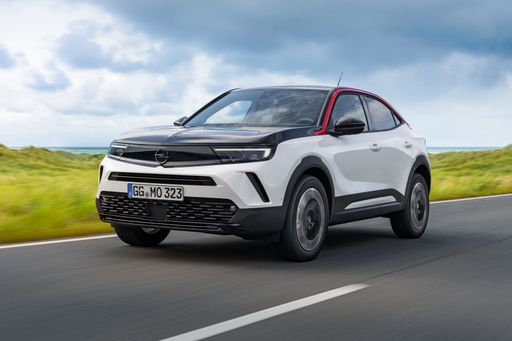 @ Opel / Stellantis Media
@ Opel / Stellantis Media
Vauxhall Mokka
Costs and Consumption
View detailed analysis
Engine and Performance
View detailed analysis
Dimensions and Body
View detailed analysis
Hyundai i10
The Hyundai i10 is a cheeky city car that squeezes big-car confidence into a pocket-friendly package, carving through tight streets with surprising composure and sensible practicality. For buyers after low fuss, sensible equipment and wallet-friendly running costs, it's a smart, no-nonsense pick that makes sense whether you're a first-time driver or need a reliable second car.
details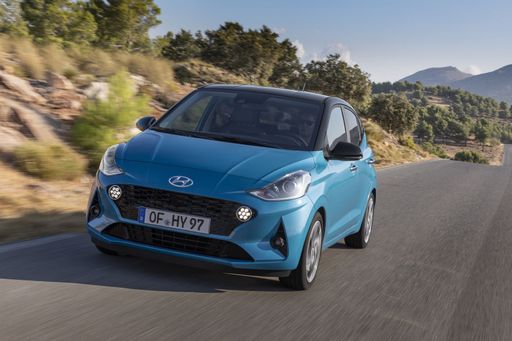 @ Hyundai Motor Company
@ Hyundai Motor Company
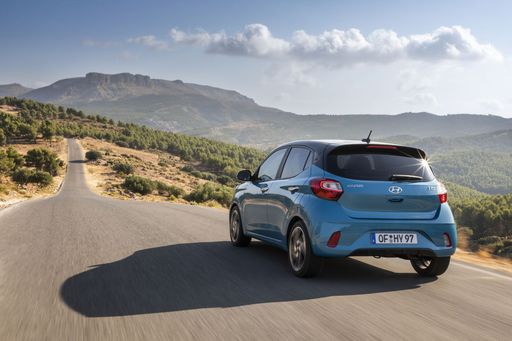 @ Hyundai Motor Company
@ Hyundai Motor Company
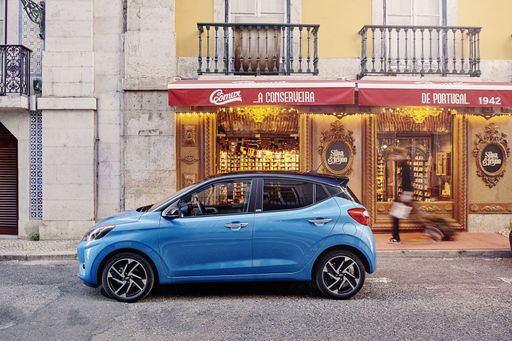 @ Hyundai Motor Company
@ Hyundai Motor Company
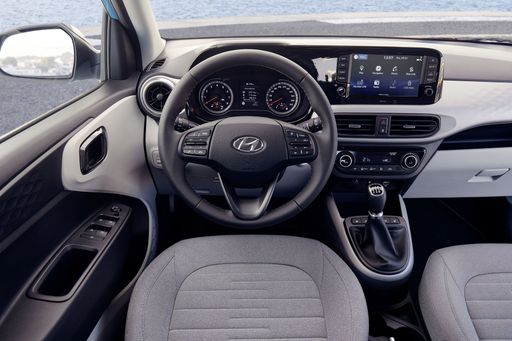 @ Hyundai Motor Company
@ Hyundai Motor Company
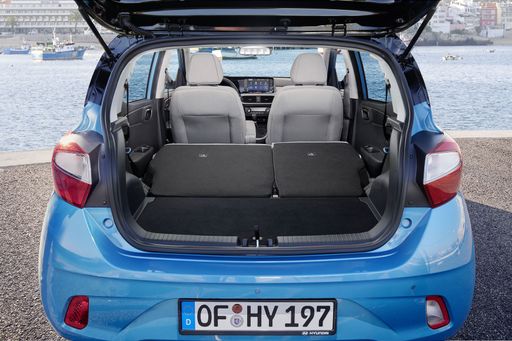 @ Hyundai Motor Company
@ Hyundai Motor Company
Vauxhall Mokka
The Opel Mokka cuts a smart, modern silhouette that feels right at home in the city while still turning heads on the open road. It's a practical, easy-to-live-with crossover that blends comfy driving manners with enough flair and tech to keep daily commutes interesting — and it won’t make you regret trading up.
details @ Opel / Stellantis Media
@ Opel / Stellantis Media
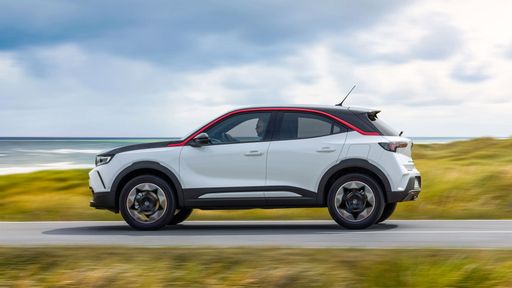 @ Opel / Stellantis Media
@ Opel / Stellantis Media
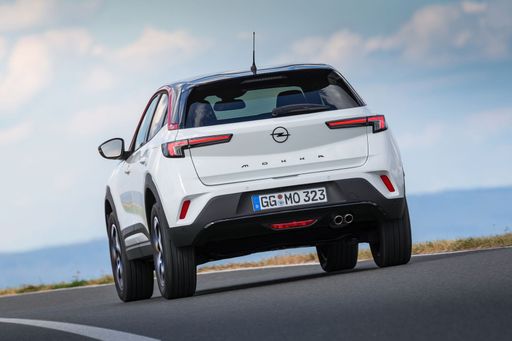 @ Opel / Stellantis Media
@ Opel / Stellantis Media
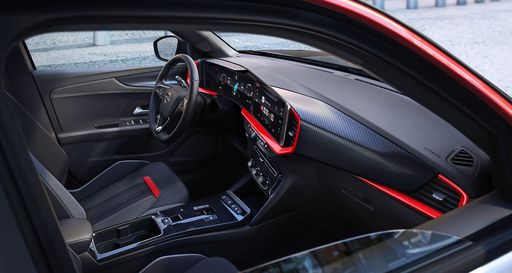 @ Opel / Stellantis Media
@ Opel / Stellantis Media
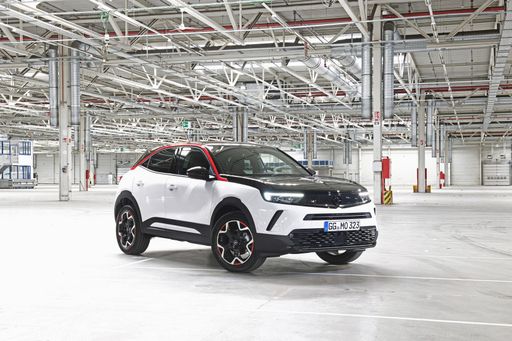 @ Opel / Stellantis Media
@ Opel / Stellantis Media
 @ Hyundai Motor Company
@ Hyundai Motor Company
|
 @ Opel / Stellantis Media
@ Opel / Stellantis Media
|
|
|
|
Costs and Consumption |
|
|---|---|
|
Price
14600 - 19000 £
|
Price
22900 - 40500 £
|
|
Consumption L/100km
4.9 - 5.5 L
|
Consumption L/100km
4.9 - 5.7 L
|
|
Consumption kWh/100km
-
|
Consumption kWh/100km
15.4 - 18.5 kWh
|
|
Electric Range
-
|
Electric Range
336 - 403 km
|
|
Battery Capacity
-
|
Battery Capacity
51 kWh
|
|
co2
110 - 124 g/km
|
co2
0 - 129 g/km
|
|
Fuel tank capacity
36 L
|
Fuel tank capacity
44 L
|
Dimensions and Body |
|
|---|---|
|
Body Type
Hatchback
|
Body Type
SUV
|
|
Seats
4 - 5
|
Seats
5
|
|
Doors
5
|
Doors
5
|
|
Curb weight
996 - 1099 kg
|
Curb weight
1294 - 1672 kg
|
|
Trunk capacity
252 L
|
Trunk capacity
310 - 350 L
|
|
Length
3670 - 3675 mm
|
Length
4150 mm
|
|
Width
1680 mm
|
Width
1787 mm
|
|
Height
1480 - 1483 mm
|
Height
1506 - 1535 mm
|
|
Max trunk capacity
1050 L
|
Max trunk capacity
1060 - 1105 L
|
|
Payload
344 - 423 kg
|
Payload
388 - 400 kg
|
Engine and Performance |
|
|---|---|
|
Engine Type
Petrol
|
Engine Type
Electric, Petrol MHEV, Petrol
|
|
Transmission
Manuel, Automatic
|
Transmission
Automatic, Manuel
|
|
Transmission Detail
Manual Gearbox, Automated Manual
|
Transmission Detail
Reduction Gearbox, Dual-Clutch Automatic, Manual Gearbox
|
|
Drive Type
Front-Wheel Drive
|
Drive Type
Front-Wheel Drive
|
|
Power HP
63 - 90 HP
|
Power HP
130 - 281 HP
|
|
Acceleration 0-100km/h
11.4 - 18.4 s
|
Acceleration 0-100km/h
5.9 - 9 s
|
|
Max Speed
143 - 175 km/h
|
Max Speed
150 - 209 km/h
|
|
Torque
93 - 172 Nm
|
Torque
230 - 345 Nm
|
|
Number of Cylinders
3 - 4
|
Number of Cylinders
3
|
|
Power kW
46 - 66 kW
|
Power kW
100 - 207 kW
|
|
Engine capacity
998 - 1197 cm3
|
Engine capacity
1199 cm3
|
General |
|
|---|---|
|
Model Year
2024
|
Model Year
2024 - 2025
|
|
CO2 Efficiency Class
C, D
|
CO2 Efficiency Class
A, C, D
|
|
Brand
Hyundai
|
Brand
Vauxhall
|
Is the Hyundai i10 offered with different drivetrains?
The Hyundai i10 is offered with Front-Wheel Drive.
The prices and data displayed are estimates based on German list prices and may vary by country. This information is not legally binding.
